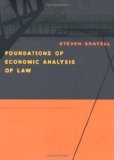
Very often legal sanctions are focused on disgorgement of ill-gotten gains. In other words, a wrongdoer “bears a sanction equal to his gains.” It does discourage undesirable behavior, but only to a limited extent as compared to a rule that sets the penalty to the level of harm caused. It can, for example, still leave an incentive to act harmfully.
Shavell says, “Suppose, for example, that an act creates a gain of $1,000 and harm of $1,000,000. If the gain is estimated to be $950, a party would have an incentive to engage in it, because the sanction would be $950 so that he would profit by $50.”
I must admit that this is not 100% clear to me. Does Shavell mean to bring in the idea that the court may underestimate the gain, thus making it potentially profitable to engage in the activity?
Steven Shavell, Foundations of Economic Analysis of Law, pp. 476-78 (2004).
